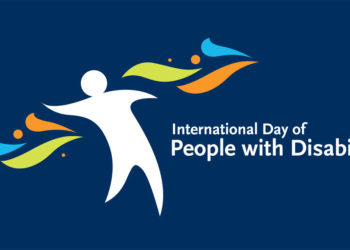Today’s guest post is by Kasia Repeta, a digital marketing professional at Duke University Press and an SSP Fellow. She previously worked as a marketing professional in Poland and Turkey.
I live in the U.S. and am a non-native English speaker. I speak English with a foreign accent as does a third of the world’s population. I am asked about my accent at least once a week, more often in out-of-work interactions but also in professional settings.
Counting both native and non-native speakers, English is considered the most widely spoken language worldwide, according to Ethnologue: Languages of the World, an annual reference publication that provides statistics on the living languages of the world. David Crystal, in his article from 2008, Updates on the statistics of English, suggests that two billion people — a third of the world’s population — are English speakers. That estimate includes first language (L1) and second language (L2) speakers. Even among native English speakers there are a myriad of differences in pronunciation and vocabulary — both within and between countries. For L2 speakers, this situation results in an even wider variety of pronunciations of English and of non-native accents, where sounds, mouth position, sentence structures, rhythms, intonations, and sound selections are borrowed from other languages. This means that they might produce pronunciation errors, which are due to the phonological and articulatory properties of both the spoken and native languages.

English is generally considered to be the lingua franca of the scientific community. A rapid growth of international scholarly publishing and international collaboration, as measured by co-authorships, benefit from the increasing number of English L2 speakers in academia and beyond. While a number of tools and services have been created to help non-native English authors (all major publishers offer some form of editing service, for example), there has been little if any attention paid to the challenges of being an L2 speaker — for example, in terms of participating in conferences and other professional events, whether as a speaker or a listener.
Most L1 speakers may argue that they do not treat anyone differently on the basis of accent, however, accent detection studies have shown that native listeners are “highly sensitive to the presence of non-native accents” and that there is growing evidence that foreign accents are a source of prejudice — positive or negative. This negative bias impacts not only people with “low English proficiency,” but also highly-proficient L2 speakers with a strong command of grammar, lexicon, and pronunciation in their second — or even first — language. To avoid prejudice and discrimination towards accented speech, it is crucial to understand accent biases in speech and why they occur.
The impact of foreign accent on social interaction and cognitive processes, based on research coordinated by Gent University as part of the “SocialAccent” project, focuses on investigating the origins of bias towards non-native accents. A bias of social origin is caused by a foreign accent triggering “a rapid categorisation of the speaker as out-group.” A bias of linguistic origin is caused by a foreign accent being “more difficult to understand than native accent, thus, reducing ‘processing fluency’.” This negative perception is reinforced by the difficulty of processing foreign-accented speech. Predictably, our brains prefer stimuli that are easier to process. Although L2 speakers can sometimes be perceived positively, they are usually judged as less trustworthy, less educated, less intelligent, and less competent than native speakers. “Why Don’t We Believe Non-Native Speakers? The Influence of Accent on Credibility,” by University of Chicago psychologists Shiri Lev-Ari and Boaz Keysar, confirms that non-native speech is not only harder to understand but also causes non-native speakers to sound less credible. Accents cause people to doubt the accuracy of what is said, and can create assumptions about the speaker’s education level, competence, intelligence, trustworthiness, and credibility — and, consequently, can have an effect on employability.
Foreign accents of workers are protected by law in the U.S. and E.U. Under the U.S. Federal Anti-Discrimination Laws, discrimination based on accent and treating employees differently because they have a foreign accent is illegal. It is only lawful if their “accent materially interferes with being able to do the job.” E.U. legislation, Commission Communication of 11 December 2002 on ‘Free movement of workers – achieving the full benefits and potential,’ states that: “the language requirement must be reasonable and necessary for the job in question and must not be used to exclude workers, so that advertisements requiring a particular language as a ‘mother tongue’ are not acceptable.” However, multiple occurrences of court cases prove that accent discrimination laws are not enforced properly. Also, while employment statements usually mention that the employer is an equal opportunity provider and do not discriminate based on age, color, disability, genetic information, gender, gender identity, national origin, race, religion, sexual orientation, or veteran status, etc, accent is rarely mentioned in such statements. Employment, opportunities for collaborations, career advancements, credibility, and trustworthiness can all be advantaged or disadvantaged by accented speech if accent-related biases and discrimination are not acted upon.
For many, including L1 speakers, participating in scholarly communication events can be a source of situational or performance anxiety. Speaking publicly in a foreign language, especially if it’s a language that is used only occasionally, can bring about fears of making mistakes and being labelled as less credible. Any accent-related remarks by L1 speakers only serve to amplify these anxieties. “Where are you from?”, “ I can hear an accent, let me guess, you’re from…?”, or “You don’t sound like you’re from here?” An L1 speaker may think that these are appropriate questions when striking up a conversation with an L2 speaker, however, they can have an adverse impact on non-native speakers’ meta-perception: a self-judgement about what others think. They are, therefore, best avoided as they are perceived as signalling that there is something wrong with the non-native speaker and can cause their withdrawal from speaking, asking questions, sharing views and, as a result, may ultimately become career limiting. Personally, I am comfortable with such questions if someone is trying to have a genuine conversation with me and, at some point, they ask about my origin. I am proud of my heritage and can relate my experience to it. However, most of the time I find these questions distressing, particularly in professional settings like conferences or networking events, especially if they come up early in the conversation. They make me question my ability to communicate without being judged or categorized. If for any reason an L2 speaker does not want to talk about the origins of their accent, the L1 speaker should be as considerate when asking about accent as they would be about topics of race, gender, ethnicity, religious, or political beliefs. Ultimately, perception matters more than intent. We, people with accents that communicate daily in a foreign language, face these kinds of questions way too often. We don’t mind sharing, but whether or not the native speaker realizes, these questions can and are often perceived as intimidating and harmful.
As mentioned earlier, one very strong cue for in-group/out-group categorization biases is an accent in speech. However, people construct their social identity based on numerous variables, and country of origin may not be one of them. If social identity does not align with the social identity associated with an accent one speaks with, any accent-related remarks become devastating to the identity of the individual by causing intimidation, putting constant pressure on the need to explain oneself, affecting the sense of belonging. This may especially concern people who may have spent many years away from their countries of birth, or left in childhood, but have an accent — a characteristic linked to one’s birthplace and therefore immutable and hard to reduce.
To make professional and social interactions more considerate, effective, and inclusive for the benefit of both L1 and L2 speakers, it is important to recognize the issues that both sides struggle with and address non-native accents from both perspectives.
Tips for L1 speakers:
- Be considerate when asking about accent as you would be about topics of race, gender, ethnicity, religious, or political beliefs
- Increase your comprehension of accented speech by taking advantage of opportunities to exposure to non-native accents at workplace, during conferences or other professional or social events. According to a study in Frontiers in Psychology, if linguistic processing of accented speech can initially impair cognitive processing, further experience allows for rapid adaptation so you can quickly learn how to process accented speech successfully)
- Make allowances for/appreciate the efforts of your L2 speaker colleagues. For many people, possible anxiety associated with accent, choosing the right words, or speaking spontaneously can, especially in professional settings, lead to feelings of frustration and insecurity, regardless of language proficiency
Tips for L2 speakers:
- Understand and stay vigilant to the fact that people have cognitive difficulty in the processing of non-native speech
- Make a conscious effort towards accent modification and/or reduction. Reducing an accent is hard but genuine efforts in reducing linguistic barriers by speaking more clearly and practicing the accent will make it easier to communicate
Above all, every one of us working in scholarly communications should be able to identify and act upon our own accent-related biases in order to build a more inclusive experience for all in our community.
Discussion
20 Thoughts on "Guest Post — “I Say Tom-ay-to, You Say Tom-ah-to”: Bias Against Non-Native English Speakers in Scholarly Communications"
Very nice article, and you have my full support for the issues presented in this post. Giving people the appropriate spaces and resources to communicate most effectively is very important, as well as and in ways which better help sustain local and regional communities.
This is something we work towards supporting a lot with the European Association of Science Editors. For example, we have 29 different language versions of our editing guidelines, so that – quite literally – the fine details of communication are not lost in translation.
The timing of this is a nice coincidence too, with the recent publication of the Helsinki Initiative on Multilingualism in Scholarly Communication. Just last week I posted the EASE statement of endorsement for this too.
here is the url to the Initiative for anyone interested: https://www.helsinki-initiative.org/en
And on a totally separate, but still relevant point, I have an anecdote from a recent conference I attended. A speaker from Rwanda was making their first ever public presentation in English, which was really well prepared. When it got to the Q&A they really struggled to interpret the question and deliver an off-the-cuff response in English. Someone in the audience offered to translate the Qs to French, then translate the speakers answer from French to English for the audience. The speaker’s relief was palpable.
I feel like this should be a more explicitly offered feature of events, it definitely had a profound impact on me, and it is a good example of everything this article discusses.
So yes – full support for the themes of this article, and thanks for publishing it!
Having translation services available at conferences is a great idea!
Though not in a scholarly setting, I have spent months at a time in areas where English is not the primary language being spoken. It is definitely difficult to make genuine connections and have deep conversations when your first language is not spoken by those around you. Just getting through the day is more tiring because you have to work so much harder to communicate.
Professionally, I do often interact with people from many nationalities (and accents) and I will admit I sometimes have a hard time understanding people when they have a heavy accent. It can feel awkward to ask someone to repeat themself or speak more slowly. Often I try to use email communication more than calling/voice because it seems easier to understand, but this post is a great reminder and encouragement that there is more I can do to become better at understanding accents different from mine. Thanks!
As an L1 speaker who has lived and worked predominantly with L2 speakers in English-speaking environments for over 10 years, I completely agree with this being a very under-appreciated issue. I suspect that there is bias in choosing conference speakers on the basis of command and use of English rather than the substance of what they might say: I often count the number of native English speakers at conferences and it is frequently in excess of 50%. I would be curious to know if it is something conference that organisers ever take explicitly into account.
Because as a native English speaker, I happen to associate a lot with those for whom English is a second language, I may have missed some this. I wonder, though, if anybody on SK would like to comment on the bias that may exist with written English, especially in journal submissions. As it happens, I spend a lot of time being the “narrative” author of internationally authored papers even when I am not the corresponding author. I also get asked to edit manuscripts of colleagues before submission, and sometimes after they have been told to have it edited by a native speaker. In several cases, they have used a paid editorial service which has done a lousy job. Further, the editorial boards of journals based in non-English speaking countries seem to have what can only be described as an idiosyncratic view of correct English. In one case, I told the author, whose work I had already edited, to forward my CV. I fear that some journals reflexly tell authors from non-native English speaking countries to have it edited by a native speaker.
As an editor for a specialist journal, I still find time to carry out extensive linguistic revisions of good papers written in bad English. I regard this as a duty imposed by my privilege.
I rather doubt that all journals and editors go this distance. As shown above, requiring that they have their paper edited by a native English speaker may result in unsatisfactory revision by a commercial agency.
I wonder how much good science ends up dumped or confined to journals of less significance than the results deserve?
A researcher of linguistic insecurity here. There certainly exists a linguistic glass ceiling. I suppose this is an even bigger problem in “interpretative studies” in social sciences and humanities, where the writer’s style and the quality of the study kind of become the same. I find it upsetting when I hear complaints about non-native speakers’ texts, but I realise that reading them requires patience and persistence. Which brings us to language editing services, or rather, the cost of a proper job… But money is one thing, and being ready to accept the responsibility for communication is another.
Thank you Alicja. It appears the money does not buy you love or competence, judging by the experience of my Polish colleagues. Actually, I have a good rapport with some co-authors who struggle with articles (the, a, an) because these are missing in their languages. But this is a personal and trusting relationship.
Background: I have worked as an “English language editor” since 1997, trying to achieve the objective of the first publisher I worked for: “The paper should appear to be written by an American scientist with a good vocabulary and an excellent command of the English language.” I have small essay I wrote for translators’ whose work I edited in 1998 explicating my understanding of “good” and “excellent” and how these categories are distinguished from “acceptable.” I also indicated how “good vocabulary” and “excellent command” are demonstrated in scientific writing with a purpose of communicating ideas efficiently and unambiguously.
Incidentally, I also edit papers by friends or friends of friends from time to time. These papers have been in chemistry, biology, etc., in addition to my normal specialty of physics and mathematics. I was also invited to lecture at one of the national research universities (a federal distinction awarded to selected universities) in Moscow on the topic of writing scientific papers in English.
Relevant example: Earlier this week, I received an email from a friend of a friend asking for help. One of the reviewers of a paper submitted to a biology journal had written: “The manuscript of … concerns the measurement of …. The authors highlighted a decrease in the adhesion force of … and a decrease in their cellular rigidity. The measurements were accomplished by …. The manuscript is comprehensive, the topic is highly interesting and should fit in the field of interest of the … readers after minor modifications.” Three minor modifications were suggested. But they were preceding by: “A native English speaker should imperatively correct the numerous grammatical errors of the manuscript.” The reviewer gave no example of an error. Could it be that the reviewer made a biased language judgment based solely on the authors’ names and affiliations?
I carefully read the draft pdf from the journal and found no grammatical errors. Perhaps, there is an error (or two) that I missed, but such errors are certainly not numerous nor obvious to a practiced editor. I was not surprised. I had spent several hours in my first edit of this paper and about an hour in my second edit before it was submitted.
For the record, American English is my native language, and Russian has been my second language for the last 26 years.
Thanks, Bill.
It confirms my suspicion that this requirement is a kind of back-protecting mantra. At best, it is a nuisance, at worst a real hindrance to publishing when it is automatic.
Non-native English speakers should also understand that queries about accent may not necessarily be to judge or single them out. It may actually be an attempt on the part of the listener to better understand the speaker by tuning their ears to the unique elements of that language. Please understand, there is anxiety on both sides. Often for fear of offending either way, crucial conversations simply do not take place. If we take the potential for “offense” out of the equation we can foster an environment where we can better truly communicate and learn.
Being a non native speaker, I do not take the question of “where Am’I from”as being offensive.It could be simply a way to strike a conversation.
I am a volunteer ESL tutor for Spanish-speaking persons and find that one of the crucial factors for both parties is the speed of speech. Especially when excited or intensely passionate about a topic, there can also be differences in intonation or emphasis that may be different in various languages. In scholarly meetings and conferences, asking people to slow down directly may be disruptive to the flow of the presentation. Perhaps in speakers’ guidelines, it can be suggested that practicing speaking at slower rate is helpful to everyone’s ability to process the speech. Enunciation typically improves at slower speeds as well.
This post made me poke around for the origin of the title, which is slightly misquoted here. It’s from the Gershwins’ “Let’s call the whole thing off,” memorably performed by Fred Astaire in “Shall we dance” (1937). The actual line is, “You like potato and I like potahto.” And the singer concludes: “Let’s call the whole thing off.” It’s satirical, and the point is that we should not get caught up in small differences, a nice lesson. But the song is very much about a different kind of accent bias, as the different pronunciations distinguish between a lower-class accent (potato) and an “elevated” accent (potahto). The movie was released in 1937, when the upper-class accent (east side of Manhattan, Connecticut) was a commonplace in movies. It’s a great movie, and I look forward to seeing it again (fouth time? Fifth?).
“You like tomayto, and I like tomahto” is in fact the second line of the song, leading to “Potayto, potahto, tomayto, tomahto–let’s call the whole thing off.”
Academic bias undoubtedly occurs for a variety of reasons. When listening to podium presentations my personal bias is for content quality and clear presentation, not language accent. As an English speaker I am not biased against other native language speakers, but I am disappointed if I cannot understand them.
I’ve heard similar issues from people with strong US regional accents, such as Deep South or Boston, too.
Rob,
I am from the south and have suffered through people who feel the need to correct or “make fun of my accent”. I finally came to the conclusion that I am who I am and proud of where I live.
A fun way to explain the issue of having (no) accent is in the standup comedy by Paul Taylor here: https://www.youtube.com/watch?v=FIqVY1SwXls
(contains a bit of bizarre sounds, and mildly offensive French language)
I like especially the way in which he shows how people “bug” when the accent of a person does not fit the content of their speech…
Thank you for the article! It relates the experience that I can directly relate to.
Thank you Kasia for a very interesting article. I’m an L2 speaker but I am not asked about my accent too often, which is probably because people can easily guess where I come from by my appearance. What causes my anxiety is more fear of making grammatical mistakes in speech than my foreign accent. L1 speakers may not know that some things in English are particularly difficult for an L2 speaker. For example, there’s no tense, no single or plural, and he/she/it all sound the same, and we don’t add a/an/the in front of a noun in spoken Chinese. So I often make mistakes on these. But as you said, these mistakes may make me sound less credible or competent, especially in the world of academic publishing, where many with editorial experience have a habit of picking up grammatical errors.
Fantastic article ! I’m an L2 speaker who moved to the US in the mid-90’s speaking heavily accented English. Two colleagues (a post-doc from Greece and a grad student from Lebanon) wit nearly perfect English took me under their wings and helped me to “polish” my accent. It was hard work, but it paid off. I went from a TBPAMWIF (time before people ask me where I’m from) of 5 seconds to about 10 minutes (after two years – as I said, hard work). The fact that a strong accent leads to negative prejudice is extremely sad, but true.
As the managing editor/copy editor/art director/general dogsbody of a journal that receives a large percentage of our submissions from L2 authors, I try very hard to get my editors and reviewers to understand, “your job is to figure out whether this person has something interesting and worthwhile to say; my job it to make sure that, once it’s accepted, it’s expressed clearly in English.” I actually find a great deal of satisfaction in this kind of editing, but I’m also lucky that I have the time to do it. The overall decline in publications that take copy editing seriously only exacerbates the barriers that L2 authors face in trying to get published. And the decline in copy editing is a direct result of the financial starvation imposed on academic publications by their institutions. In order to support a global circulation of ideas through publication that’s supposed to be one of the functions of higher education and research, we can’t keep undermining the very basic processes that make it possible.



